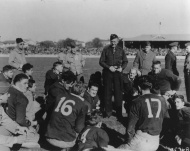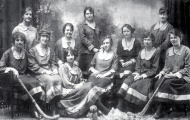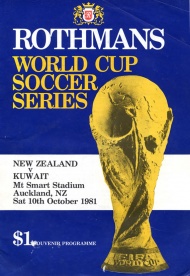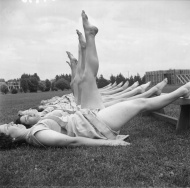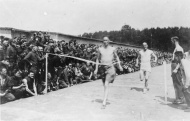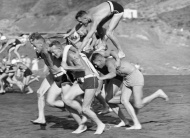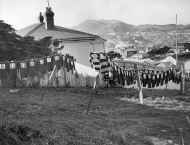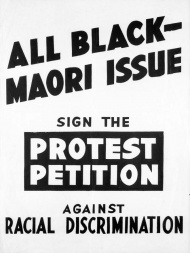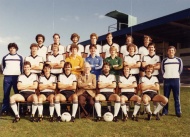Events In History
-
 23 October 2011All Blacks win their second World Cup
23 October 2011All Blacks win their second World CupThe All Blacks won the Webb Ellis Cup for the second time in seven attempts, defending grimly to hold onto an 8–7 lead over France in front of 61,000 spectators at Eden Park, Auckland. Read more...
-
 12 July 2001New Zealander wins Tour de France stage
12 July 2001New Zealander wins Tour de France stageThe first stage win by a New Zealander in the Tour de France came in a team time trial. Although Chris Jenner didn't finish with the core of his Credit Agricole team, he shared in the stage win and got to stand on the podium. Read more...
-
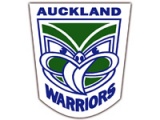 10 March 1995Auckland Warriors debut
10 March 1995Auckland Warriors debutThe Auckland Warriors played their first match in the New South Wales Rugby League’s expanded Winfield Cup competition, losing 25-22 to the Brisbane Broncos. Read more...
-
 20 June 1987All Blacks win the first World Cup
20 June 1987All Blacks win the first World CupWith Michael Jones, John Kirwan and captain David Kirk scoring tries, the All Blacks defeated France 29-9 at Eden Park, Auckland. Kirk became the first captain to lift the Webb Ellis Cup. Read more...
-
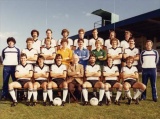 16 May 1981All Whites beat Australia on road to Spain
16 May 1981All Whites beat Australia on road to SpainThe New Zealand football team's famous 2-0 victory in Sydney was a defining moment in their epic qualifying campaign for the 1982 World Cup finals. Read more...
-
 1 February 1981Trevor Chappell bowls underarm
1 February 1981Trevor Chappell bowls underarmTrans-Tasman sporting relations reached their lowest point at the Melbourne Cricket Ground when Australian captain Greg Chappell ordered his brother Trevor to bowl the final delivery of a limited-overs cricket international against New Zealand underarm Read more...
-
 15 February 1978New Zealand beats England in a cricket test for the first time
15 February 1978New Zealand beats England in a cricket test for the first timeChasing 137 for victory in the first test at the Basin Reserve in Wellington, England was bowled out for 64, with Richard Hadlee taking 6 for 26. Read more...
-
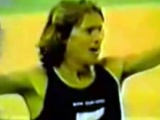 31 July 1976John Walker wins gold in Montreal
31 July 1976John Walker wins gold in MontrealFollowing in the footsteps of Jack Lovelock and Peter Snell, Walker won gold in the Olympic 1500 m. Black African nations boycotted the Games in protest at the All Blacks' tour of South Africa Read more...
-
 4 February 1975First woman to swim Cook Strait
4 February 1975First woman to swim Cook StraitAmerican Lynne Cox became the first woman to swim across Cook Strait, battling heavy seas and strong winds during her 12-hour crossing. Read more...
-
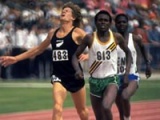 2 February 1974'The greatest middle distance race of all time'
2 February 1974'The greatest middle distance race of all time'In an amazing Commonwealth Games 1500-m final, New Zealand’s John Walker broke the world record yet finished second. Tanzanian Filbert Bayi won in a new world record time of 3 minutes 32.16 seconds. Read more...
-
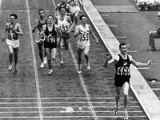 21 October 1964Peter Snell wins second gold in Tokyo
21 October 1964Peter Snell wins second gold in TokyoSnell had successfully defended his 800-m title earlier at the Tokyo Olympics and completed the coveted middle-distance double with gold in the 1500 m. Fellow Kiwi John Davies won bronze. Read more...
-
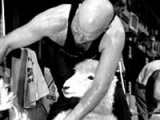 21 April 1961First Golden Shears competition
21 April 1961First Golden Shears competitionFirst held at the Masterton War Memorial Stadium in 1961, the Golden Shears competition has become the iconic event for the shearing and wool-handling industry in New Zealand. Read more...
-
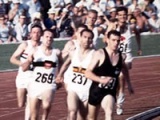 2 September 1960Golden day for Kiwi runners in Rome
2 September 1960Golden day for Kiwi runners in RomeIt was one of New Zealand's greatest days at the Olympics. Peter Snell won gold in the 800 m and Murray Halberg followed up 30 minutes later to win the 5000 m, completing a remarkable track double in Rome's Olympic Stadium. Read more...
-
 10 May 1960All-white All Blacks leave for South Africa
10 May 1960All-white All Blacks leave for South AfricaThe slogan ‘No Maoris − No Tour’ fell on deaf ears and this controversial rugby tour went ahead. The issue of sporting ties with South Africa was to split the country in devastating fashion in 1981. Read more...
-
 13 March 1956NZ's first test cricket victory
13 March 1956NZ's first test cricket victoryAfter 22 draws and 22 losses in 26 years of test cricket, New Zealand defeated the West Indies by 190 runs in the fourth test at Eden Park. Read more...
-
 28 March 1955NZ cricketers skittled for 26
28 March 1955NZ cricketers skittled for 26Bert Sutcliffe top-scored with 11 runs as New Zealand was skittled for the lowest total in test cricket history – a mere 26 runs. Read more...
-
 23 July 1952Yvette Williams leaps for gold at Helsinki
23 July 1952Yvette Williams leaps for gold at HelsinkiNew Zealand's first female Olympic medallist, Yvette Williams (now Corlett) won gold in the long jump with an Olympic record leap of 6.24 m (20 feet 5 and 3/4 inches). Read more...
-
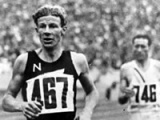 6 August 1936Lovelock wins 1500-m gold at Berlin
6 August 1936Lovelock wins 1500-m gold at BerlinJack Lovelock won New Zealand's first Olympic athletics gold medal before Adolf Hitler and a crowd of 110,000 at the 1936 Berlin Olympics. He led the 1500-m field home in a world record time of 3:47.8. Read more...
-
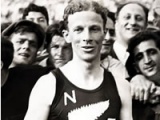 15 June 1935Lovelock wins ‘Mile of the century’
15 June 1935Lovelock wins ‘Mile of the century’In June 1935 Lovelock returned to Princeton – the scene of his 1933 world record – to compete against the top American milers in what the media later dubbed the ‘Mile of the Century’ Read more...
-
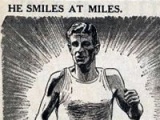 15 July 1933Lovelock smashes world mile record
15 July 1933Lovelock smashes world mile recordJack Lovelock's run at Princeton University beat the record for the mile, held by Jules Ladoumegue, by 1.4 seconds. The race was dubbed the 'greatest mile of all time' by Time Magazine. Read more...
-
 7 July 1924'Tom Watson' wins bronze for New Zealand
7 July 1924'Tom Watson' wins bronze for New ZealandThe character in the Academy Award-winning film Chariots of fire (1981) was based on Arthur Porritt, who won a bronze medal for New Zealand in the 100 m at the 1924 Paris Olympics. Read more...
-
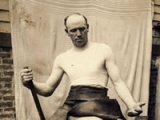 25 November 1903Fitzsimmons wins third world boxing title
25 November 1903Fitzsimmons wins third world boxing titleBy winning the world light-heavyweight championship, Timaru boxer Bob Fitzsimmons became the first man ever to be world champion in three different weight divisions. Read more...
-
 16 April 1892NZ Rugby Union founded
16 April 1892NZ Rugby Union foundedAs rugby increased in popularity, it became more important to standardise the administration of the game in the colony. Despite some opposition, a New Zealand Rugby Football Union was founded. Read more...
-
 22 May 1884First NZ Rugby team in action
22 May 1884First NZ Rugby team in actionThe first representative New Zealand rugby team played its first match, defeating a Wellington XV 9-0 before embarking on a tour of New South Wales. Read more...
Articles
Natives' Rugby Tour, 1888-89

The title of 'The Originals' was bestowed on the next New Zealand rugby team to tour Britain, that of 1905-6, but even though it was soon forgotten, the Natives' tour was to have enduring significance for New Zealand rugby and society.
-
Page 2 – Rugby in 1888
The rugby played by the Natives was different from the game we know today.
-
Page 3 – Maori and rugby
In 1872, 'Wirihana' became the first recorded Maori rugby player when he turned out for Wanganui
-
Page 4 – Preparations
In the absence of any body regulating the game in New Zealand, Eyton was free to promote a tour of Britain as a private venture
-
Page 5 – The 'Noble Maori' arrive
After playing nine matches in New Zealand and two in Melbourne in the southern winter of 1888 (with only two losses), the Natives set off for Britain by steamer.
-
Page 6 – Daily routines
Between their first and last matches in Britain, the Natives played on average every 2.3 days.
-
Page 7 – Unsporting behaviour?
Although hacking and tripping had been banned in the 1870s to make the game safe enough to appeal to gentlemen, rugby remained dangerous.
-
Page 8 – Natives and northerners
In 1888 the gentlemen who ran the Rugby Union (and the Empire) were based in southern England, and the England test was played in London. Yet the playing strength of the
-
Page 9 – Rugby and society
What effect did the Natives' tour have on rugby and wider New Zealand society? It showed that New Zealanders could compete on equal terms with representatives of the imperial
-
Page 10 – Matches played
Games and scores Total (rugby games only): played 107: won 78, drew 6, lost 23 Points for: 772; Points against: 305 In Britain: played 74: W49, D5, L20 Points for: 394; Points
-
Page 11 – Further information
This web feature was written by David Green and produced by the NZHistory.net.nz team. Books
Sport, 1940-1960

The mid-century decades brought more mass participation in sport, the consolidation of many national competitions, and greater achievement at international level.
-
Page 2 – Lydiard's legacy
The cult of masculinity had one positive spin-off: Arthur Lydiard. A runner of iron will but limited natural ability, he discovered that as he ran further he got fitter.
-
Page 3 – Women's sport, 1940-60
Women's sport matured in New Zealand after 1945. Mass participation in a period of prosperity, and increased mobility thanks to the now-common motor car, were crucial
-
Page 4 – Competitors and spectators
Sports participation and spectatorship were the only daytime leisure activities to rival home-centred pursuits such as gardening in this period. New Zealand's hosting of
-
Page 5 – Changing trends
Professionals in an amateur age
-
Page 6 – Further information
Links and books relating to Sport in New Zealand 1940-60
1981 Springbok tour

For 56 days in July, August and September 1981, New Zealanders were divided against each other in the largest civil disturbance seen since the 1951 waterfront dispute. The cause of this was the visit of the South African rugby team – the Springboks.
-
Page 2 – All Blacks versus Springboks
Since rugby went professional in 1995 countries like Australia, England and France have challenged New Zealand and South Africa's claims to be the two powerhouses of world
-
Page 3 – Politics and sport
South Africa's apartheid policies and attitudes created obvious problems for New Zealand rugby, given the prominence of Māori in the sport.
-
Page 4 – Stopping the 1973 tour
Keeping sport and politics separate was becoming increasingly difficult. In July 1969 HART (Halt All Racist Tours) was founded by University of Auckland students with the
-
Page 5 – Gleneagles Agreement
The All Blacks accepted an invitation to tour South Africa in 1976, when world attention was firmly fixed on the republic because of the Soweto riots.
-
Page 6 – Battle lines are drawn
The tour supporters were determined that the first Springbok visit to New Zealand since 1965 would not be spoiled. The anti-tour movement was equally determined to show its
-
Page 7 – Tour diary
Select itinerary of the 1981 tour by the Springbok rugby team.
-
Page 8 – Impact
In Hamilton the protestors occupying the pitch had chanted 'The whole world is watching'. The same applied to New Zealand as a nation. Some believed the tour was an opportunity
New Zealand cricket

Relive some of the highs and lows in the history of New Zealand's most popular summer team sport, cricket. Although the game has been played here since the 1830s, international success – especially against traditional rivals England and Australia – was a long time coming.
-
Page 3 – The World Cup
A brief history
1982 Football World Cup
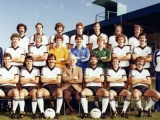
As New Zealand prepares for the 2010 FIFA World Cup, we look back to 1981-82, when football first seized the country’s imagination. After slogging through an epic qualifying schedule of 15 games, the 'All Whites' took on the best in the world at the 1982 finals in Spain.
-
Page 2 – Qualifying rounds
New Zealand’s long road to Spain began on Anzac Day 1981 with a hard-fought 3–3 draw with Australia at Mount Smart Stadium, Auckland.
-
Page 3 – Playing in the finals
The New Zealanders were given little hope against their opposition in Group 6, which was dubbed the ‘pool of death’. This group included the cup favourites, Brazil
-
Page 4 – All Whites' results
Results from qualifying and finals games played by New Zealand
1987 Rugby World Cup

In a country where rugby became a surrogate for religion, hosting and then winning the first Rugby World Cup was a big deal. The story of how the tournament came about mixes the worlds of sport, politics and money.
-
Page 2 – Origins of international rugby
Before the 1987 Rugby World Cup and the professional era, rugby prided itself on extolling the virtues of friendly rivalry.
-
Page 3 – The long road to the cup
There were many obstacles along the road to the first Rugby World Cup.
The 1970s

The 1970s were an era of economic and social change. Global oil shocks hit the New Zealand economy hard, while protests against the Vietnam War and nuclear testing continued. A new generation of activists raised questions about race relations, sexuality and the welfare system in New Zealand.
- Page 2 - OverviewSummary of what NZ was like in the 1970s, including our population, economy, popular culture, protest issues, politics and sporting
The 1960s

Five decades ago most Kiwis enjoyed a standard of living that was the envy of other nations. During the 1960s the arrival of TV and jet airliners shrank our world, and New Zealanders began to express themselves on a range of international issues, including opposition to the Vietnam War.
- Page 2 - OverviewSummary of what NZ was like in the 1960s, including our population, economy, popular culture, sporting achievements and technology
Dominion status

On 26 September 1907 the colony of New Zealand ceased to exist. It became, instead, a dominion within the British Empire.
- Page 6 - New Zealand in 1907What was New Zealand like at the time of becoming a dominion?
Biographies
-
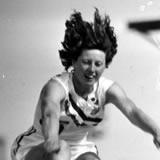 Williams, Yvette Winifred
Williams, Yvette Winifred
The sports writer Peter Heidenstrom rated Yvette Williams as his 'New Zealand Athlete of the Century'. There is no doubt that she was one of our greatest-ever athletes - and probably the most versatile.
Read more... -
 Reid, John Richard
Reid, John Richard
After debuting for the New Zealand cricket team against England in 1949 John Reid went on to play another 57 tests for his country, 34 of those as captain.
Read more... -
 Lydiard, Arthur Leslie
Lydiard, Arthur Leslie
Arthur Lydiard was a marathon runner and athletics coach, whose most notable trainees included Olympic and Commonwealth Games champions.
Read more... -
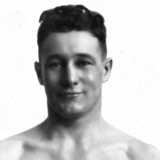 Morgan, Edward
Morgan, Edward
Ted Morgan was a boxer and a plumber, and was the first New Zealander to win an Olympic gold medal.
Read more...
Related keywords
- rugby
- all blacks
- eden park
- running
- jack lovelock
- athletics
- olympics
- marathon running
- fitness
- arthur lydiard
- boxing
- wellington city
- WW2
- athletic park
- american forces
- rugby league
- cricket
- famous firsts
- farming
- sheep
- newtown
- arthur porritt
- yvette williams
- ted morgan
- world cup
- soccer
- peter snell
- commonwealth games
- cook strait
- basin reserve
- john walker
- maori sport
- cycling
- leisure
- western front
- passchendaele offensive
- music
- theatre
- WW1
- all whites
- motor sport
- golf
- south africa
- racism
- john reid
- railways
- dominion day
- school journal
- dominion of new zealand
- immigration
- economy
- murray halberg
- basketball
- hockey
- bowls
- motherhood
- alcohol
- assisted immigration
- immigrants
- women
- film
- chinese
- popular culture
- 1970s
- labour party
- national party
- statistics
- teaching
- john pascoe
- prisoners of war
- piha
- oral history
- north african campaign
- clothing
- winston mccarthy
- radio broadcasts
- george nepia
- publishing
- writing
- colin meads
- dunedin
- royal tours
- apartheid
- 1960s
- david kirk
- webb ellis
- moustaches
- protest
- police
- springboks
- demonstrations
- robert muldoon
- 1980s
- norman kirk
- HART
- gleneagles agreement
- united nations
-
Main image: Arthur Lydiard
Arthur Lydiard was a marathon runner and athletics coach, whose most notable trainees included national, Olympic and Commonwealth Games champions.



